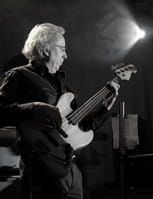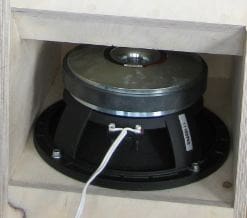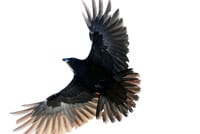- Posts: 9
- Thank you received: 1
Tapped Horn corrections needed ?!
- andywave
-

- Offline
- New Member
-

quote-
By the last panel, do you mean the panel that is closest to the mouth of the horn, as the last if you follow the path from the speaker to the mouth opening?
Interesting, would you have any clue as to why this is. It is the biggest "mismatch" from the model, but as by your testing has the least effect.
-quote
Yes I mean the last (and largest) corner panel, closest to the mouth. When it was deleted I got most benefits and least harm. Empirical research some times gives best end results along with mathematical or physical headache.
One thing popped my mind, Mykey on the other forum endorsed me to make the very first corners the totally round instead of reflectors as the horn makes 180 degree turn in small increment of path length. Haven't tried that though.
It could have something to do with the first corners being in high pressure zone. Otoh the particle speed there would be at its lowest.
Or maybe the horn would amplify distortions rising from eddy currents whirling in the first corners?
Sorry, more new questions than answers.
Andy
Please Log in or Create an account to join the conversation.
- jdfwessels
-
 Topic Author
Topic Author
- Offline
- New Member
-

- Posts: 14
- Thank you received: 2
Well, it's what we are after. Better, even if we don't have the answer as to why.
I did read the Miss Piggy topic, looks impressive. I noticed you used a kind of phase plug at the point where the speaker fires into the horn. Did you find this an advantage for the end result (what was to your observation the improvement). How did you decide on the size of it. I did try a version after i read your topic. One change i made was, i made it out of 2 different sized circled panels, following the shape of the cone. If i lay the plug into the speaker, it would kind of fill the cone area.
After this addition, i did some power tests, but to short to be able to tell the difference.
Second to that, I did build a slightly bigger THAM12, som 4 inches higher and deeper and 2 inches wider. Also changed the first part of the horn, which now start at 1,8 cm at the front. I will post a drawing when it's finished. Also a larger mouth. First tests were very impressive, much more and deeper low freq. Also less boomy than the THAM12.
The slightly bigger TH..
A "phase plug" with a volume that just fill the 12 inch Faital cone
I also ordered a special microfoon (Behringer ECM8000) and TrueRTA software to do some measurements myself (time for some reading and study as to how that would be accurate :ohmy: .
Will post the results may next week.
Keep you informed.
Kind regards,
Frans
- andywave
-

- Offline
- New Member
-

- Posts: 9
- Thank you received: 1
The phase plug diameter in my case was simply chosen to maintain the throat area of 420cm2 as round slit and the height of round stack of disks was altered until satisfactory results were obtained. I had multiple round disks made of 18mm and 27mm ply, cut down from driver hole offcuts of other projects.
Too small front volume restricted the low end efficiency and impulse accuracy suffered.
I did not try to follow the cone shape, that may give whole different results. Mykey on the other forum has used a round cornered cone shape bulge in front of driver, in brute45 horn.
Andy
Please Log in or Create an account to join the conversation.
- martinsson
-

- Offline
- New Member
-

- Posts: 6
- Thank you received: 3
I did build a slightly bigger THAM12, som 4 inches higher and deeper and 2 inches wider. Also changed the first part of the horn, which now start at 1,8 cm at the front. I will post a drawing when it's finished. Also a larger mouth. First tests were very impressive, much more and deeper low freq. Also less boomy than the THAM12.
Hello, and tanks for sharing your findings, it is allways nice to see a THAM design being built and evaluated, even more so when it spinns of in different ways of modifications, the THAM desings are ment to be regarded as basic platforms on which to make your own thing, or simply leave them as they are and be happy with that.
I really like your points of what makes up a good design with regards to portabillity and modularity, simillar guidlines are what made the THAM designs what they are, but I added one more in the spirit of DIY.
- minimal budegt, tooling and driver requirements.
To me, building a decent and compact bassbin that is suitable for most usercases should not require alot when it comes to money, knowledge or facillities, additionally it should be forgiving on dirver parameters, tweaking a design to it's maximum is rather easy given a fixed set of conditions and fixed driver parameters, but that is rarely the case if you want to accomodate the needs and means of diy'ers worldwide.
Setting a fixed geometry cone-compensator, reducing the S2, or adding a assymetrical coneloading inlet-feature might leave you with a design not being as forgiving on various drivers found in parts of the world where B&C, Beyma, faitalpro, eighteensound or other high end manufacturers lacks sustantial market precsence.
Balancing a design catering to all from "modest means" to "top notch pro-grade budget" while still providing decent perfomance, remaing easy to build and staying compact along the way is indeed a challange, in short the balacing of compromises is key, still, I'm happy you found a way of improving upon it given your needs and means, and also for sharing it with the community.
Regarding the question addressing refelctors along path, the thinking was to weigh it against ease of build and the need for internal system volume which is in short supply in such a compact design, additionally there also was a concern regarding the abillity to filter out the out of bandpass resonances from reaching the apparture.
Finally a coupple of thoughts on your latest findings, a longer pathlength, bigger mouth, greater compression ratio and over all lager system volume will give exactly you what you find it does, but this also means stepping away from being as compact, as easy to build and as forgiing on T/S parameter spread when used in anger, meaning it might also impact driver lifetime in some cases, as a less forgiving design might increase the stress on the driver (compression, asymetrical coneloading).
This is not ment as crticisim of your new take on the THAM12, not at all, nor as an atmept to justify the THAM12 original design, I'm sure it can be improved upon, this is simply a way of describing why it took the form it did.
Thanks for shaing your build, thoughts and questions, it is benefiting all of us, and I hope you feel it has been a worthwhile experience, and I'm looking forward to hearing more.
Best regards / Martinsson
Please Log in or Create an account to join the conversation.
- jdfwessels
-
 Topic Author
Topic Author
- Offline
- New Member
-

- Posts: 14
- Thank you received: 2
This is very nice to hear specially from you. It was your blog that provided me with so much information, that I took the challenge and build them. I agree your comments, it is I think very challenging to stick with the starting points and accept compromises. I have to question myself, keep it small and "simpel to build = euro's" or go alle the way.
I still would like to better understand the part of a TH, being the throat. For some reason, while reading tons of internet pages, forums and patent descriptions, it is not dear for me at all. It feels like "the more you know, the better I understand I don't know nearly enough..." :sick:
Could you help me in trying to find how to shape the throat? Feel free to correct or even tell me I way off...
- All horn articles state that a horn is a transformer which goes from high pressure, low velocity to low pressure high velocity, hence high SPL.
- High pressure must be created by compression of the drivers moved air mass.
- So, I thought I need a compression chamber to load the driver in a correct way. Also correct loading the driver is key to keep it in one peace, reduce distortion, etc.
- What it boils down to (at least I think it does), if we get the loading correct, the rest will be a walk in the park.
- If the above is correct, then why do I see almost ALL tapped horn designs WITHOUT some kind of compression / or narrowed horn opening to load the driver and get compression??
- I did see some discussions (by a forum ember at DIY audio called DJIM), but for some reason, in every threat the discussion starts, but then moves of topic ending with NO answers. IS THIS TO COMPLEX TO TACKLE??
I did read some comments from Tom Danley, that the S1 - S2 is key to proper loading, but what does that mean.
I have seen the following suggestions;
They all make sense i some way, and maybe all can be used, but as you stated in your answer, asymmetrical driver loading may cause damage to the driver over time.
So 2 KEY questions for me,
1 - WHAT IS the most efficient Throat for the THAM12. I guess it will always be somewhat asymmetrical because the first segment is not q square box by itself. I favor the V-shape (just feeling..)
2 - is it possible to use HORNRESP to figure this out. I see some parameters that handle this subject, but have never seen anyone using it.
Kind regards and hoping to hear from you,
Frans Wessels.
- martinsson
-

- Offline
- New Member
-

- Posts: 6
- Thank you received: 3
If I may, I would sugest the latter, simply due to the fact that you may find new solutions or answers that benefits alot of other potential builders on the way, it is allways beneficial to break new ground, given that you feel you have the time and resources to do so.I have to question myself, keep it small and "simpel to build = euro's" or go alle the way.
There is no pride here on my part, no "do this or do nothing", I strongly belive in the power of open colaboration and development without restrictions, and I'm a big fan of open source, this is after all how I got into the game in the first place, others shared their knowledge without compromise, patents or inherit restrictions, and having built upon that myself I feel it not only fair but almost as a sort of codex to push that spirit of open development on if I can.
An excellent quote, this also says a bit about my ramblings above, in that some one else might know and could tell you about itthe more you know, the better I understand I don't know nearly enough...
I'll be more then happy to try, just remeber that I'm not the one with all the answers, far from it, and just like you I expect a healty correction if needed.Could you help me in trying to find how to shape the throat? Feel free to correct or even tell me I way off...
Woth noting is also the fact that we have yet to incorporate any such device(s) in any THAM design to date, the reasons for this is stated in my previous post, and in the light of that I have not looked into it even though I have recieved several proposals on the subject, some of which is shown in your psot above.
My guess would be that he adresses the initial energytransfer to the hornpath and setting the propper driver friendly environment, kind of what we talked about earlier.I did read some comments from Tom Danley, that the S1 - S2 is key to proper loading, but what does that mean.
1 - WHAT IS the most efficient Throat for the THAM12. I guess it will always be somewhat asymmetrical because the first segment is not q square box by itself. I favor the V-shape (just feeling..)
A highly efficient energytransfer would to my mind be a slot, with the same area as the effective cone area, gradually expanding to the same width as the box internal with over as long a distance as possible, say the length of the first folding segment, this might call for a distance baffle to be deployd, in order to create more room between the driver and the baffle it is facing.
Alternativly, and something that feels like the best way to me even though it might be a bit complex, would be to keep a round cutout (as it is originally) with an area that of Sd, but close it off towards the sides and start of the horn following the cutout circular shape, like a half cylinder, or U-shaped, gradually expanding out to the internal with of the box over as long a distance as possible (first segment), and deploy a cone volume corretion. This would give you a bit more even coneloading while increasing the energytransfer without reducing the S2 and is not shown in any of the examples you provided.
[Disclaimer mode] There is no sicence behind these statements, I'm just going with my gut feeling on this rather complex topic, and as such they might be faulty [/Disclaimer mode]
I belive there is, but it is not yet clear to me exactly how to do it, or perhaps this level of detailed simulation calls for akabak scripting wich is an engineers wet dream, but not this perticular engineer as I found it to be very complicated to say the least, sorry, but perhaps someone else could shine a light on this for both of us.2 - is it possible to use HORNRESP to figure this out. I see some parameters that handle this subject, but have never seen anyone using it.
Please Log in or Create an account to join the conversation.
- Bongo
-

- Offline
- Junior Member
-

- Posts: 24
- Thank you received: 1
I'm eager to build one, I'd like to go lower than the tham12, I've been checking out 2 other versions, the fth12, but it has too much of a dip, then this version: forum.speakerplans.com/tham-12-a-compact...opic64833_page2.html
That sims very nice, but I can't find the plan!
The case with WAE is the opposite, no input data, I'd have to spend some time getting it right.
Please Log in or Create an account to join the conversation.
- Bongo
-

- Offline
- Junior Member
-

- Posts: 24
- Thank you received: 1
It's strange this .jpg is called version 2, even though the drawing says version 1
If you look here there's a slightly newer version, but it's still called version 1!
I tried to sim the bigger version with the numbers from the drawing
Ovindas version actually plays a bit lower, according to the sim, but the mouth is a bit strange, the box is smaller, I won't go as deep, but nearly.
Please Log in or Create an account to join the conversation.
- martinsson
-

- Offline
- New Member
-

- Posts: 6
- Thank you received: 3
Please Log in or Create an account to join the conversation.
- Bongo
-

- Offline
- Junior Member
-

- Posts: 24
- Thank you received: 1
Please Log in or Create an account to join the conversation.






